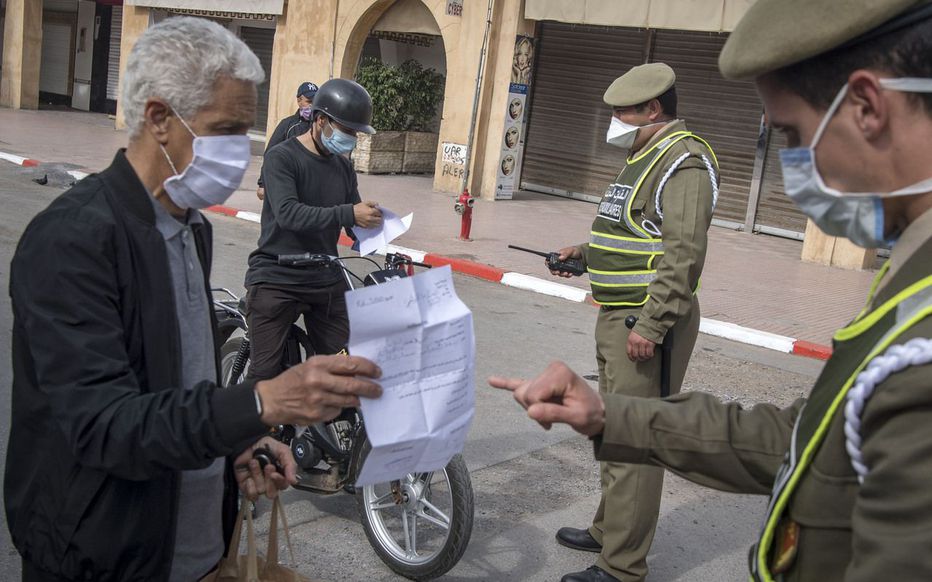Although, on April 22, 2020, Morocco recorded around 3446 cases of Covid-19 disease, the outbreak of this epidemic would directly affect Morocco in its vital sectors, especially tourism, industry, trade, transport and the banking sector. The Moroccan economy will be affected indirectly, given that the most important strategic partners of Morocco who have been affected severely, as the numbers, the warning started from the diminishing of the gross domestic product, whether in China or Europe. This will negatively affect the situation, if the situation continues or worsens the Moroccan GDP, which in turn may affect the major projects launched by Morocco, mainly the projects that depend on the sector of banks such as the integrated program to support and finance the enterprises, which the banking sector is a pivotal partner in its success. Morocco is trying to mitigate this issue by providing financial resources to avoid the consequences of this virus on the Moroccan economy. The Moroccan King announced the constitution of the “Corona Virus Pandemic Management Fund” which includes the amounts paid from the public budget, the contributions of the public companies and of the private sector, which mainly aims to rehabilitate the health system and related expenses. With the support of the national economy, in order to face the effects of Corona virus “covid-19”, the expenditures related to maintaining jobs and mitigating the collective repercussions of the spread of the Corona virus, which reached the limits of March 24, 2020, about 23.5 billion DH. The energy sector may be the only sector that Morocco can benefit from due to the outbreak of the Coronavirus. Since Morocco is not a petroleum producer, but is included among the consuming countries, the low price of a barrel is in its interest, as it limits its spending in dollars, which positively affects the rate of the local currency due to raising the margin of its liberalization to 5% on March 9, 2020.
Covid- 19 has affected the trade balance too, in different ways. First, the borders are closed because of this epidemic. This has affected touristic balance, which used to contribute to a large part to the global trade balance. A study carried out by the national tourism confederation CNT estimates that 500 000 jobs and 8,500 businesses in the tourism sector will be impacted by this crisis, in particular travel agencies, tourist transport, car rentals, hotels and catering services, by estimating losses of tourism turnover of 34 billion DH for 2020. Second, the inconspicuous spread of the virus all over the world, including ours, necessitated quarantine to limit the circulation of Coronavirus. This quarantine has itself affected Moroccan national industry; people can’t work like before, especially in manufacturing spaces, with the same production rate, this has influenced the quantity to be exported. The main sectors, which are mostly impacted by this quarantine, are automotive industry and textile manufacturing. The temporary suspension of Renault and Peugeot activities directly touched 12,600 employees .The continuation of this situation will have an impact on the 180,000 employees in 250 industrial units constituting nine ecosystems in the sector. With regard to the textile industry, it was threatened by a lower in foreign demand, notably from France and Spain, which represent 60% of exports. In addition, the procurement from China is disturbed, which affected the jobs of 160,000 people in 1,200 units. We can say that Covid-19 has affected our commercial balance negatively, except the new industries, which appeared in those last weeks, such as medical pipes manufacture, and artificial respirator manufacture.
Bank Al-Maghreb has forecasted a growth rate of 2.3% for this year (few months before the pandemic). Foreign trade constitutes 32% of the gross domestic product. But 2/3 of our trade is with the European Union hit hard by the Covid-19, 55% of tourists who come from this area, as well as 69% of MRE transfers and 72% of FDI. Therefore, we see that the negative impact of the pandemic on foreign trade is quite significant and can be assessed between 20 and 30%. In addition, due to the impact of the scarcity of precipitation this winter, which augurs for a below-average season, especially if there is no spring rains, growth could be below Bank Al-Maghreb forecasts. Moreover, the Moroccan Center for Economic Outlook forecasts a growth rate of only 0.8% in 2020. It is based on the following elements: the growth of the world economy should slow down to 2%. The 2019-2020 crop year affected by the low rainfall would be poor, the cereal production would hardly exceed 40 million quintals and the drop in the Bank Al-Maghreb key rate by 0.25 point not going to have a direct effect on the real economy. With the temporary shutdown of some companies and the slowdown of activities for many, the devastating impact of the COVID-19 pandemic on the world economy could be between 2000 and 4100 Billion Dollars, or 2.3% to 4.8% of the GDP global according to the Asian Development Bank.
From an international perspective, the first country to suffer from the impact of COVID-19 is China, the country which settles in 2nd row of the world powers. The drastic containment, which necessitated the curtailment of the activities of a number of large manufacturing and retail businesses, has tremendously slowed the Chinese economy. Fortunately, as China has successfully stopped the explosive increase of the numbers of infected cases, Chinese manufacturers have returned to full capacity. However, while the world is going through a similar form of shutdown, the country’s economy is hit a second blow with the closing of foreign markets. According to a document by IMF economists, China will suffer from the reduction in world demand, which accounts for 20% of the Country’s economy. The job market in the U.S.A is deteriorating at an unprecedented rate. 6.6 million US citizens have lost their job during the last week of March. The crisis severity is historic in the rest of the world. Falling oil prices are a major concern for Saudi Arabia ($ 22 per barrel), the lowest price in 17 years. The oil prices have known a major fell in the US as well (the price of May WTI Crude oil fell to -$40 a barrel on Monday) In the Eurozone, the PMI fell the sharpest on record (29.7 in March), after settling at 51.6 in February. A number below 50 indicates a contraction in activity.
Authors
- ESSITRI NABIL
- EL AMIM OTMANE
- JAJIT MERIEM
- EL MOUSTAINE AWATIF
- EL IDRISSI MAKHLOUFI SAMAH
- BIYAD IMANE
Resources:
- https://www.boursenews.ma/article/maroc/deficit-commercial-dernieres-statistiques-avant-l-impact-du-coronavirus
- https://www.medias24.com/coronavirus-les-exportateurs-marocains-naviguent-a-vue-8117.html
- https://www.boursenews.ma/article/maroc/deficit-commercial-dernieres-statistiques-avant-l-impact-du-coronavirus
- https://www.lafinancepourtous.com/2020/04/07/limpact-de-lepidemie-de-covid-19-sur-leconomie-mondiale/





1 Comment
Abdlkhalek
Good work